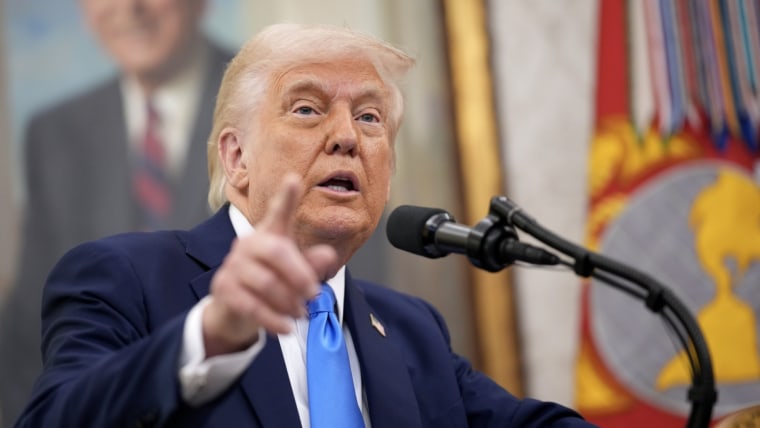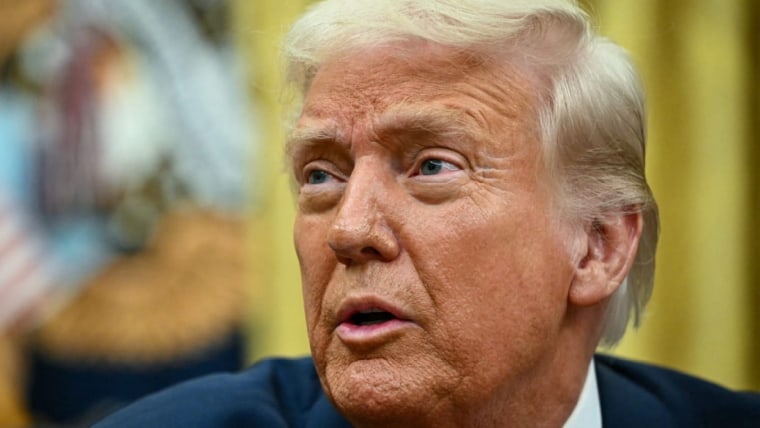On Sunday, President Donald Trump threw down the gauntlet to people who want to preserve constitutional democracy in this country. He told NBC’s Kristen Welker that he is “not joking” about the possibility of serving a third term, despite the 22nd Amendment’s prohibition on any person being “elected to the office of the President more than twice.”
When asked how he would get around those words, Trump said ominously, “There are methods which you could do it.” I will leave it to others to identify loopholes in the language of the 22nd Amendment, assuming that the president cares about such niceties. Already, Trump is laying the groundwork for a third term, separate from the debates over the 22nd Amendment, by destroying or intimidating institutions that might stand in his way and claiming unconstitutional authority to control elections.
Americans are already struggling to keep up with the daily assaults on democracy, but we cannot afford to forget the future.
We saw further evidence of this strategy on Friday when the president brought another prominent American law firm to heel. The terms of Skadden, Arps, Slate, Meagher & Flom’s surrender erode its independence, assure it will be a vassal of MAGA-world well into the future, and show Trump’s determination to ready the way to end free and fair presidential elections three years from now.
Americans are already struggling to keep up with the daily assaults on democracy, but we cannot afford to forget the future. Attacking, discrediting, intimidating and silencing both critics and the institutions that support criticism is familiar in regimes that seek to consolidate their power in the hope that they will never relinquish it. We see signs of this strategy in the president’s attack on law firms, universities, the free press and judges. His executive orders are consolidating his power and easing us toward a nondemocratic future.
Recall that Trump urged his supporters last year to “get out and vote, just this time.” He explained that if they did, they “won’t have to do it anymore. Four more years, you know what, it will be fixed, it will be fine, you won’t have to vote anymore ... ”

On Sunday, the president signaled that even if the 2028 election is held as scheduled, he wants to ensure it would not be competitive, just as Viktor Orbán achieved in Hungary. What Trump would consider an achievement is, as The Atlantic’s Anne Applebaum writes, an autocratic takeover. Since Orban won a second term as Hungary’s president, he has mixed paeans to populism and family values with the destruction of press freedom and academic freedom and the politicization of the courts and the civil service. That has eased his way to claim emergency powers and amend Hungary’s constitution, even as the country has fallen into poverty and corruption has become legalized.
Howard Simon, former executive director of the American Civil Liberties Union, explains that “capturing or marginalizing independent centers of thought and dissent that could challenge their authority” is what authoritarians do.
That brings us back to Skadden Arps, which last week became the second firm to cut a deal with the administration in the wake of Trump’s executive orders targeting various law firms. Skadden had not been the subject of an executive order, and three firms have already successfully challenged the orders in court. But Trump said the firm agreed to “essentially a settlement,” including “a total of at least $100 Million Dollars in pro bono Legal Services during the Trump Administration and beyond.”
If the president is thinking about how to stay in power in 2028, those who want to preserve democracy need to react accordingly.
Unsurprisingly, the president insisted that some of the ransom he extracted from Skadden to stay out of his line of fire would be devoted to “ensuring fairness in our Justice System.” Note also, the open-ended phrases like “and beyond” and “at least.” Whatever happens in the 2028 election, you can rest assured that Skadden Arps will not represent anyone opposing Trump or seeking to hold him accountable.
The Washington Post reports that many other firms are unwilling to take on clients who are Trump opponents. “The president is following a playbook from other countries whose leaders have sought to undermine democratic systems and the rule of law, including Russia, Turkey, and Hungary,” writes the Post’s Michael Birnbaum. “Leaders in those countries have similarly attacked lawyers with the effect of hollowing out a pillar of justice systems to expand their power without violating existing laws.”
If that were not enough to convince pro-democracy forces to mobilize now to ensure we have a free and fair election in 2028. The president’s recent executive order on elections purports to seize powers for himself from both the states and the independent Election Assistance Commission. Linda Meyer, emeritus law professor at Quinnipiac University, says, “The decentralization of voting systems has been a guarantee of integrity in federal elections because federal employees in the current administration cannot control the entire process. This EO is targeted to wrest control over voting from states and allow the feds to get info about how each person votes.”
In what Meyer calls the “worst case scenario,” Trump can use his executive order to “target federal enforcement of this EO in [Democratic] areas and throw out votes there … while leaving [Republican] districts alone. Perhaps he can also find out exactly who voted for him and who didn’t and ‘investigate’ only those registrants who voted against him.”

For someone like Trump, who thinks an election can only be fair if he wins, the temptation to use his order that way may prove irresistible. For those who believe that the 2028 elections can be free and fair no matter what Trump does, the president’s executive order on elections proves that he thinks otherwise.
And as The New Republic’s Michael Tomasky points out, Trump’s actions at the Defense Department, starting with the nomination of Defense Secretary Pete Hegseth, have all been undertaken with the goal of “purging … an independent, rules-based military in favor of a military loyal to a single leader.” The result is that “there’s no one around to stop Trump from declaring martial law and suspending the Constitution or even an election.”
Regardless of whether the courts rule on the constitutionality of a third term for Trump, he is already preparing to make their rulings moot through means that have nothing to with the 22nd Amendment. If the president is thinking about how to stay in power in 2028, those who want to preserve democracy need to react accordingly. Political leaders, lawyers and election experts must map a strategy for stopping the president. And the rest of us should prepare to copy the strategies for mass mobilization and protest used to save democracy in other countries. There is no time to waste.
